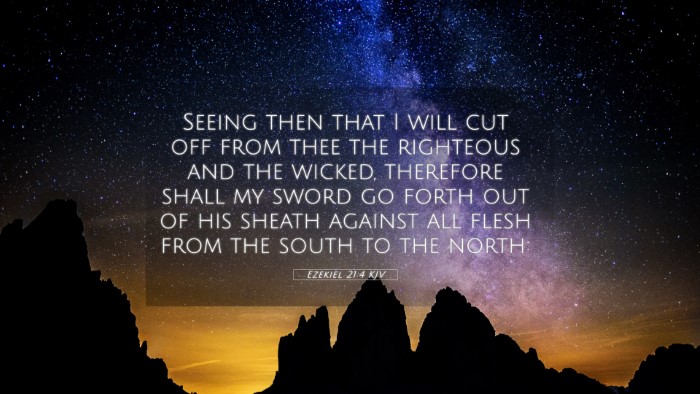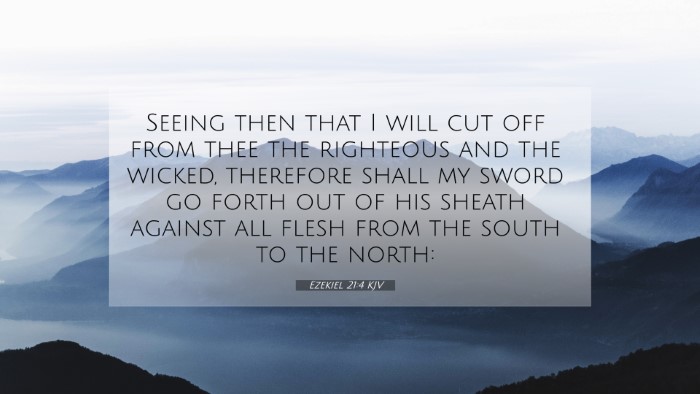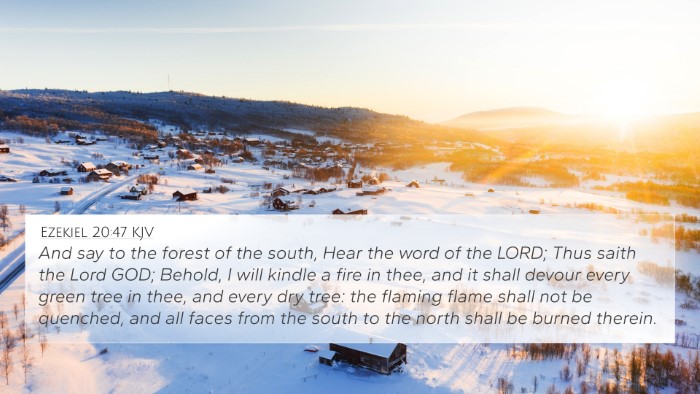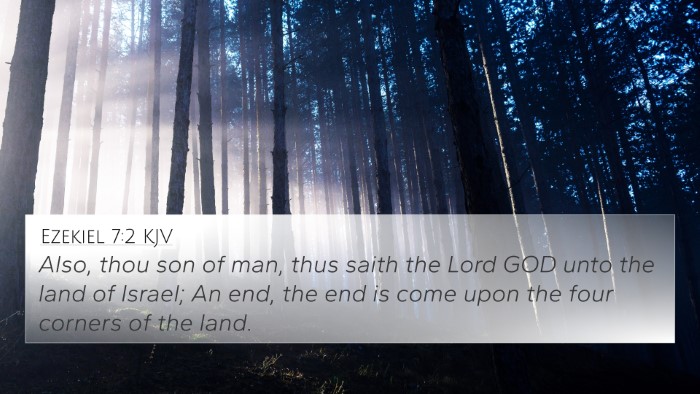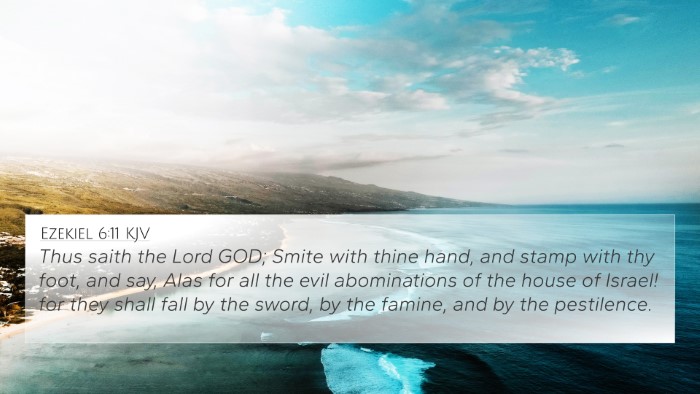Ezekiel 21:4 - Summary of Meaning and Interpretations
Ezekiel 21:4 states:
"Because the king of Babylon stood at the parting of the way, at the head of the two ways, to use divination: he made his arrows bright, he consulted with images, he looked in the liver."
Contextual Overview
The book of Ezekiel contains prophecies delivered by the prophet Ezekiel during the Babylonian exile of the Jewish people. This particular verse presents a vivid image of the Babylonian king, Nebuchadnezzar, as he prepares to decide the fate of Jerusalem. The imagery used implies a critical moment where choices lead to significant consequences.
Insights from Public Domain Commentaries
Matthew Henry's Commentary
Matthew Henry emphasizes the sovereign power of God in determining the fate of nations, illustrated through the actions of the Babylonian king. The act of divination reflects Nebuchadnezzar's reliance on pagan practices to make decisions rather than seeking divine guidance. This serves as a reminder of the consequences of turning away from God's wisdom.
Albert Barnes' Notes
Barnes provides a detailed analysis of the divination process described in this verse. He notes that the king's actions signify his desperation and the serious nature of his decision-making. The consultation of arrows and inspection of the liver are indicative of ancient practices aimed at discerning divine will, showcasing a contrast between earthly wisdom and the guidance found in God.
Adam Clarke’s Commentary
Clarke focuses on the meaning of the symbols used in the passage. He explicates the significance of the “two ways” representing choices in leadership and potential outcomes for the Jewish people. The reference to the king's rituals highlights the conflict between faith in God and reliance on superstition, urging readers to reflect on where they place their trust.
Thematic Bible Verse Connections
Ezekiel 21:4 can be linked to several themes in Scripture, particularly concerning the sovereignty of God over human affairs, the folly of trusting in pagan practices, and the importance of seeking divine guidance. Here are some relevant connections:
- Proverbs 3:5-6: "Trust in the Lord with all your heart, and lean not on your own understanding." This verse emphasizes reliance on God rather than human wisdom.
- Isaiah 47:13: "You are wearied in the multitude of your counsels; let now the astrologers, the stargazers, the monthly prognosticators stand up and save you." This verse criticizes reliance on occult practices.
- Jeremiah 10:2: "Thus says the Lord: Do not learn the way of the Gentiles; do not be dismayed at the signs of heaven." It warns against adopting pagan rituals.
- 1 Corinthians 1:19-25: This New Testament passage highlights God's wisdom contrasted with worldly wisdom, fitting the theme of Ezekiel's lament over kingly choices.
- Psalms 32:8: "I will instruct you and teach you in the way you should go; I will guide you with My eye." This suggests the guidance God offers compared to the futility of divination.
- James 1:5: "If any of you lacks wisdom, let him ask of God, who gives to all liberally and without reproach." This encourages seeking divine wisdom in decision-making.
- Ecclesiastes 7:12: "For wisdom is a defense as money is a defense, but the excellence of knowledge is that wisdom gives life to those who have it." Highlights the protective power of wisdom.
- Proverbs 14:12: "There is a way that seems right to a man, but its end is the way of death." This underscores the dire consequences of misguidance.
- Psalm 146:3: "Do not put your trust in princes, nor in a son of man, in whom there is no help." This warns against trusting fallible human leaders.
- Jeremiah 29:11: "For I know the plans I have for you, declares the Lord, plans to prosper you and not to harm you, plans to give you hope and a future." A reassurance of God's sovereign plans amidst chaos.
Applications and Lessons
The exploration of Ezekiel 21:4 provides several lessons for today's readers:
- Trust God's Sovereignty: Acknowledge that God is ultimately in control, even when circumstances appear bleak.
- Avoid Superstition: Reflect on modern practices that may parallel ancient pagan rituals and ensure faith is placed in God alone.
- Seek Divine Guidance: Develop a habit of prayerfully seeking God's will in decision-making rather than relying on worldly methods.
- Understand Consequences: Recognize that choices made today can have profound repercussions tomorrow; therefore, seek to choose wisely aligned with God's word.
- Encourage Spiritual Discernment: Educate oneself on how to discern the will of God, contrasting it with worldly wisdom.
Conclusion
Ezekiel 21:4 serves as a poignant reminder of the choices leaders make and their impact on the people. Through the lens of various commentaries, readers can delve deeper into the meaning of the text while drawing connections to other Scripture. By engaging in Bible verse cross-references and thematic connections, one can foster a comprehensive understanding of biblical principles and encourage a holistic approach to faith and decision-making.

